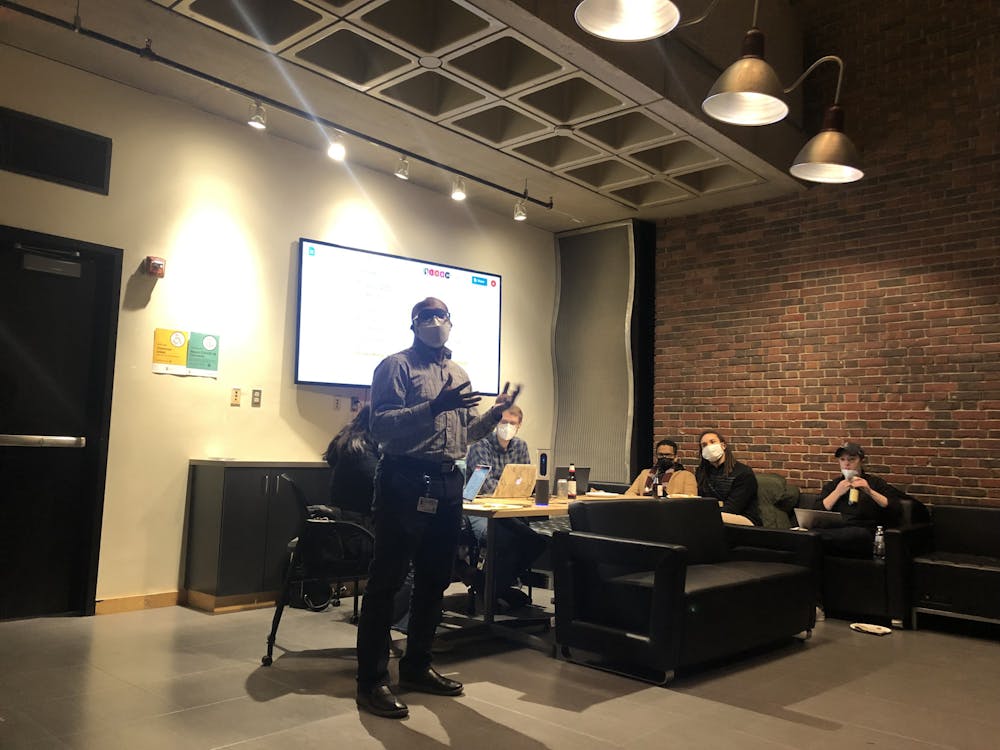Jamall Pollock, who serves as the graduate student-focused Counseling and Psychological Services provider, encouraged graduate students to utilize University counseling resources at the final Graduate Student Council general body meeting of the semester Wednesday evening.
As part of an initiative put in place this semester to distinguish graduate student counseling support from that of undergraduate students, Pollock currently designates 40% of his work time exclusively to graduate students.
Graduate students had previously expressed wishes to have access to counseling in a physical space distinct from undergraduates, leading to the establishment of a new clinical space dedicated to graduate students, The Herald previously reported.
But Pollock said that he has seen a relatively low number of graduate students utilize CAPS resources, a trend that mirrors what Pollock characterized as an overall resistance across the broader student body to make initial CAPS appointments since the onset of the COVID-19 pandemic.
He anticipated that more graduate students would engage with the resources after gaining more information, such as how to make CAPS appointments, his work hours and office locations.
In response to Pollock’s statement about the lack of graduate student demand for counseling services, GSC President Kathryn Thompson GS suggested that this could be a result of graduate students feeling historically disconnected from CAPS. Despite Pollock’s new designated focus on supporting the graduate community, Thompson said students may feel uncomfortable based on their past experiences.
Pollock emphasized that his new role as a graduate student-focused counselor served to address some of these concerns, but he encouraged continued conversations about past negative experiences with CAPS.
Following the CAPS conversation, Chair of Nominations Alex Jordon GS presented a report on the performance of graduate student committees. The report was based on data collected from a survey sent to all graduate students called the “Quality of Service Survey,” which was available from July to September and aimed to assess graduate student committees and task forces.
One specific goal of the evaluation, according to Thompson, was to consider how to diversify the pool of students serving on committees in order to ensure that they reflect different experiences of the student body.
According to Jordon, the report found that the current committee protocol is effective in promoting diversity. When comparing recognized graduate student committees to unrecognized ones or ones that operate outside of GSC, recognized committees are more diverse and have much larger international student representation, the report found. Thompson added that this representation is significant because 43% of graduate students are international. Survey data also showed that committee members reported feeling “happy,” “healthy” and “considered.”
The report concluded with a series of recommendations for committees, including designating a committee position for master’s students, continuing adherence to GSC protocols for recognized committees, ensuring transparency in committee appointment and maintaining communication with GSC.
The executive board also summarized takeaways from the Ivy+ Summit, a conference with the graduate student councils of other Ivy+ institutions. GSC felt they were performing relatively well compared to its Ivy+ peers in regard to its relationship with administration and its efficiency in executing initiatives, Thompson said. Still, they identified a few places for improvement such as continuing to push for a graduate student center and strengthening the graduate student career advising program, which they plan to model off of the Princeton advising program.
Chair of Social Events Abdullah Rashed Ahmed GS informed members of upcoming events, including a Mask-erade Ball this Friday and a planned presentation by the Fall ’21 Distinguished Speaker Jonny Wu Dec. 11.





